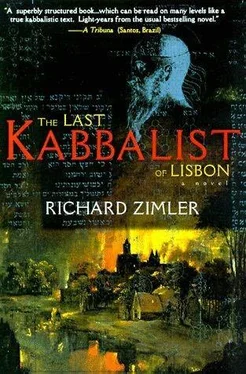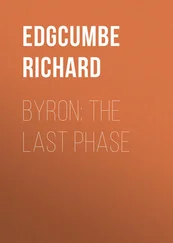Richard Zimler - The Last Kabbalist of Lisbon
Здесь есть возможность читать онлайн «Richard Zimler - The Last Kabbalist of Lisbon» весь текст электронной книги совершенно бесплатно (целиком полную версию без сокращений). В некоторых случаях можно слушать аудио, скачать через торрент в формате fb2 и присутствует краткое содержание. Год выпуска: 1998, Издательство: Arcadia Books, Жанр: roman, Исторический детектив, Философия, на английском языке. Описание произведения, (предисловие) а так же отзывы посетителей доступны на портале библиотеки ЛибКат.
- Название:The Last Kabbalist of Lisbon
- Автор:
- Издательство:Arcadia Books
- Жанр:
- Год:1998
- ISBN:нет данных
- Рейтинг книги:5 / 5. Голосов: 1
-
Избранное:Добавить в избранное
- Отзывы:
-
Ваша оценка:
- 100
- 1
- 2
- 3
- 4
- 5
The Last Kabbalist of Lisbon: краткое содержание, описание и аннотация
Предлагаем к чтению аннотацию, описание, краткое содержание или предисловие (зависит от того, что написал сам автор книги «The Last Kabbalist of Lisbon»). Если вы не нашли необходимую информацию о книге — напишите в комментариях, мы постараемся отыскать её.
The Last Kabbalist of Lisbon — читать онлайн бесплатно полную книгу (весь текст) целиком
Ниже представлен текст книги, разбитый по страницам. Система сохранения места последней прочитанной страницы, позволяет с удобством читать онлайн бесплатно книгу «The Last Kabbalist of Lisbon», без необходимости каждый раз заново искать на чём Вы остановились. Поставьте закладку, и сможете в любой момент перейти на страницу, на которой закончили чтение.
Интервал:
Закладка:
As for me, I was covered with pig blood and sawdust by Christian children on my way home from the baptism ceremony. But they never learned of the gift they gave me; my burning humiliation summoned the grace of God to me, and I had the first ever of my visions.
This preternatural occurrence began when Farid saw me in the courtyard. Out of shame, I ran from him. As I reached the kitchen door, however, a presentiment of eyes watching over me forced me to stop. When I turned, a white light appeared to me in the sky, far away, above the Moor’s castle. As it drew closer, wings sprouted, and I saw that the luminescence had been but a supernal egg. A radiant heron of ruby red, black and white took form, and as it flew over the Little Jewish Quarter, wind from its flapping blew fiercely against me. When I looked down at myself, the blood and sawdust were gone.
Uncle told me that God had shown me my continued purity and had revealed the Christian stain to be simply an illusion. I answered, “It wasn’t God; it was just a bird.”
“But Berekiah,” he said, “God comes to each of us in the form we can best perceive Him. To you, just now, He was a heron. To someone else, He might come as a flower or even a breeze.”
Indeed he was right; at my darkest moments, the Lord has always appeared to me as a kind of bird, perhaps because I most easily see the beauty of creation in those creatures gifted with flight.
Recalling other words of Uncle’s wisdom, I said now to Aunt Esther, “The Devil is just a metaphor. It’s religious language. You can’t expect all words to have everyday meanings.”
“As God is my witness, it’s too early for kabbalistic philosophy!” she answered.
Aunt Esther’s harsh tone of voice moved Judah to climb up next to me on the bench. His lips were pressed together into that slit of forced silence which Mother’s shrieks and slaps had taught him. Of late, he’d learned to do everything he could to avoid being her last, impossible burden—to tiptoe, not run, through childhood.
The trap door to our cellar, located at the southwest corner of the kitchen, suddenly opened. Uncle Abraham, my spiritual master, rose from the staircase, his forehead bathed in sweat and his hair waving off in a hundred different directions, as if he’d been caught in a spiritual storm. A small finchlike man of darting movements, his pointy face was centered by a long, angular nose that gave him an amusing look to strangers, but which connoted a probing intelligence to all those who knew him. His smooth dark skin, the color of cinnamon, seemed to highlight his wild crest of silver hair and tufted eyebrows. Graying stubble softened his cheeks, and where they looped inward, added a shadowing of sagely age to his face. Always, but particularly after prayers, his eyes burned with that secret green light, that piercing strangeness, that distinguished him at once as a powerful kabbalist. “Who’s that?” he asked squinting. “Ah, it’s our friendly priest!”
“Where’d you come from?” demanded Carlos, still unused to my uncle appearing out of nowhere. “We looked in the cellar not five minutes ago. Sometimes I think you’re a lez .”
“What’s a lez? ” Judah asked.
“A ghost that comes back to play tricks—a spirit jester,” I answered.
Uncle grinned appreciatively and wiggled his right hand in the air to show his five fingers; in Jewish lore, lezim were reputed to only have four. “My movements parallel life’s mysteries,” he said with a dismissive wave. Raising his eyebrows, he nodded inquisitively toward the muffled voices coming from the back of the house.
“Dona Meneses,” I explained. “She’s brought fabric for another dress. Purple, this time.”
He took coffee and, after a quick blessing, wolfed down a hard-boiled egg. We’d already finished shaharit , morning prayers, together, but he again wished me good morning with a kiss on the lips. Lifting Judah onto his lap, he assaulted him with little popping kisses and growling noises. Not usually demonstrative, the coming of the Passover made Uncle giddy with affection.
“I just came to tell you that I decided not to sell the sapphire,” Carlos said with a sigh that seemed to request forgiveness.
My master’s lips suddenly curled in that way that made him look menacing. He said, “I think you should reconsider.”
“You’re buying gemstones?!” I asked. I looked to my aunt for her protest. But she was busy tracing her glance over a Book of Psalms she’d recently copied for an Old Christian nobleman, proofreading carefully. Turning back to Uncle, I added, “If we had that kind of money, we could close the store, leave this desert for a few weeks.”
My master gave me a challenging look. “A sapphire cut during the time of Rabbi Solomon Ibn Gabirol,” he said. He spoke in Hebrew except for the word safira in Portuguese.
Solomon Ibn Gabirol was a master Jewish poet of the eleventh century from Málaga. “I’m afraid I’ve lost the trail of your thoughts,” I said.
“ Petah et atsmehah shetifateh delet. Knock upon yourself as upon a door,” Uncle replied.
That was his condescending way of saying I was to keep quiet and look inside myself for an answer. “Way too early for your mystical advice,” I countered.
He answered by filling my cup with water. “Keep drinking and you won’t get angry. The fluids will carry the white bile from your system.”
“Any more liquid and I’ll drown,” I replied.
“You’ll drown when you disappear in God’s ocean.” Lifting a finger to his lips, he requested silence. Turning back to Carlos, he said in a grave tone, “The safira could be lost, you know.”
“My responsibility.”
My master lifted Judah from his lap and sat him on one of our Persian pillows. “Off you go,” he said. To Father Carlos, he added, “Lost forever, I mean. Your position puts you in danger.”
As he spoke, I realized that we weren’t talking about a gemstone at all. Safira was code for Sefer , Hebrew for book. He was undoubtedly negotiating to purchase a work of Rabbi Solomon Gabirol’s and smuggle it out of Portugal. But why talk in code inside our house, where we were safe from the spying eyes and ears of the Old Christians?
Father Carlos nodded with a gesture of excuse and stood up to take his leave.
“One warning—I’m going to keep trying to convince you,” my master said with fierce determination in his voice.
The priest crossed himself with a trembling hand. Trying to mollify Uncle Abraham, he offered a misguided effort at humor and replied, “Your kabbalistic sorcery doesn’t scare…”
My master jumped up from the table, glaring at Carlos. Motion in the room seemed suspended by his rage. “I never practice magic!” he said, using the Hebrew term, kabbalah ma’asit, practical kabbalah, to designate this forbidden activity. “You should know that well, my friend.”
He was referring to the time Father Carlos had requested an amulet to kill a slanderer spreading rumors about the priest’s continued allegiance to the faith of Moses. Uncle had refused, of course, although he had personally appealed to Rabbi Abraham Zacuto, the King’s astronomer, to see that the evildoer was silenced. Now, he walked to the hearth and stared at the backs of his fingernails in the light of the fire. His topaz signet ring etched with the form of an ibis, symbol of the divine scribe, glowed with an inner sunset. “When Adam and Eve were born in Eden, they were covered with nail from head to toe as armor,” he said. Turning back to Carlos, he added, “And now, our fingernails are all that remain from this primal protection. A tiny border, don’t you think? Not much against the weapons of the Church.”
Читать дальшеИнтервал:
Закладка:
Похожие книги на «The Last Kabbalist of Lisbon»
Представляем Вашему вниманию похожие книги на «The Last Kabbalist of Lisbon» списком для выбора. Мы отобрали схожую по названию и смыслу литературу в надежде предоставить читателям больше вариантов отыскать новые, интересные, ещё непрочитанные произведения.
Обсуждение, отзывы о книге «The Last Kabbalist of Lisbon» и просто собственные мнения читателей. Оставьте ваши комментарии, напишите, что Вы думаете о произведении, его смысле или главных героях. Укажите что конкретно понравилось, а что нет, и почему Вы так считаете.












